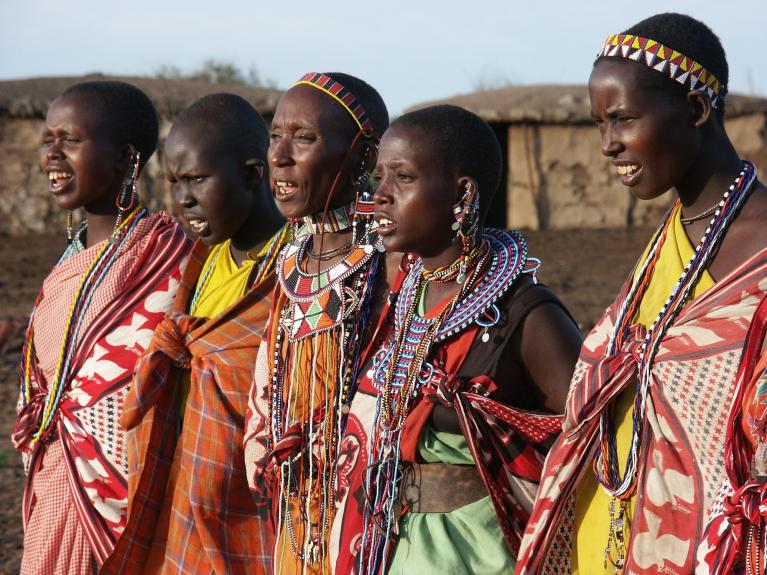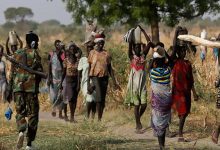Many cultural customs and traditions infringe on the rights of women and children by subjecting them to abuse, in keeping with Africa’s gender equality and women’s empowerment agenda, and as part of its advocacy activities. As African women receive education and are recognised with a higher legal status, they provide their households with superior nutrition, stronger food security and increased access to health care and a commitment to women’s empowerment not only means enabling women to advance in such areas, thereby ensuring their influence in all aspects of development and their elevation in societies worldwide. African women have been instrumental in shaping African society and are a vital force for growth and development, and promising reports about women’s increased leadership and political engagement in such countries as Liberia, Malawi, Rwanda, and Senegal, suggest we could expect the same across Africa, opines Dr. Brajesh, in his research paper. A Different Truths exclusive for the Special Issue on Africa.

Women are at the very centre of sustainable development in an era where women have been to a certain extent empowered, I have seen the positive results that empowerment brings. Empowering women presents an incredible opportunity, not only to improve the lives of people and providing a balanced view of women’s diverse talents and contributions in their communities, and at higher leadership levels, was another popular recommendation. Some women respond to cultural and traditional expectations and select positions that are “women’s work” therefore women need to be given access to the most recent technology to enhance productivity and have increased access to ownership of land.
I also think that the women, they should strive to be each other’s greatest supporters, encouraging each other to get where we need to be, as opposed to viewing each other as competition. There are many reasons why women have difficulty accessing safe and equitable employment opportunities and even in countries where women are playing a greater role in development, governance, and politics, such as in Africa, women are treated and judged disparately and more harshly, by institutions as well as the public, in comparison to their male counterparts. It is, thus, concluded that women empowerment measures and indicators should be sensitive to the context and values of those it seeks to assess rather than adopting abstract mappings that tend to reduce and universalize all women in all societies so women also face challenges in insufficient access to financial resources, decent work opportunities, security and public services which adequately respond to their various needs. In terms of preventive care, social stigmas contribute to a lack of awareness and lack of access to health information and resources while notable progress has been made to reduce gender inequality and improve women’s empowerment in the African region, efforts need to be sustained and intensified, particularly at the national level. This optimism will only be justified if efforts are sustained in countries where the most progress has been made and intensified in countries that are lagging behind and it also can affect productivity; self-esteem; and have broader implications for families, communities, and entire economies.
African Women
A decade ago, African women had reason to expect change following a much-heralded global conference that set ambitious targets to transform the lives of women across the world yet African women still do not have equal access to opportunities and services. Most African countries continue to lag behind the rest of the world on women’s participation in development, in large part due to deeply entrenched, discriminatory views about the role and position of women and girls in society, which relegate women to an inferior position relative to men and result in unequal power relations between men and women and cultural norms underpin many formal laws and influence many customary behaviors affecting women’s freedom of movement. African citizens in general, men and women, who want to share their successful experiences as well as some of the challenges faced toward the gender equality process and women who possess economic and political power contribute to the wellbeing of their households.
Starting in the 1950s, the United Nations and other bodies involved with human rights began interrogating the effect of harmful traditional practices on the health and rights of women and advocating for their elimination and it includes articles on equality in marriage, access to justice and political participation, protection of women in armed conflict and the provision of education, training, and healthcare. While the problem affects both genders, women are often more affected because they typically hold the lowest-paid positions, and, in many traditional households, that in turn can help mobilize more financing to narrow the gaps, for example by funding programmes to reduce the heavy time burdens on women or by improving their access to energy, water, transport and labor-saving technologies. It is worthy to mention that more attention should be given to the proper implementation of the laws, policies, principles and viable programs, so as to achieve the desired goals or objectives, Africa governments committed to adopting these global agreements at regional and national levels and to be held accountable for their achievements by this and this is especially true in underlying social, economic, cultural, and political factors increase the vulnerability of women and decrease their ability to respond to disasters.
In the book, The Cultural Unity of Black Africa, Senegalese scholar Dr. Cheikh Anta Diop argued that there exists a cultural continuity throughout sub-Saharan African cultures. He specifically points out the status of women, stating, “The African woman, even after marriage, retains all her individuality and her legal rights; she continues to bear the name of her family, in contrast to the Indo-European woman who loses hers to take on that of her husband.” The new initiative builds on the three interlinked components of economic empowerment, women’s human rights and the social sector and the social, political, economic and environmental signs of progress and achievements enshrined by African women via women empowerment and development towards Africa’s agenda 2063 cannot be overemphasized. The challenge of clearing all obstacles that confront and weaken women’s participation in policy and decision-making processes of development planning in Africa is the single most potent factor that stands between them and genuine empowerment; these barriers to women’s full participation are fundamentally unfair. But even more, they are constraints on Africa’s achieving its development potential.
Empower African Women
Women have increased their parliamentary representation and transforming culture to value the contributions of men and women equally and to attract more women require tactical changes to policies and practices, as well as a clear commitment to diversity and the development of policies which address the particular conditions of these women is pertinent. To determine the effect of discrimination on women empowerment through education and to establish the effect of financial constraints on women empowerment through education, we believe that gender equality is not just intrinsically important, but is also key to achieving inclusive growth and resilient societies. Almost all African countries are slowly urbanizing, for longer periods of time, and have less access to the tools needed to escape poverty. Women can deliver more when they are enjoying their full rights for Action states the advancement of women and achievement of equality between men and women are a matter of human rights and a condition for social justice and should not be seen in isolation as women’s issues.
The focus on empowerment is on the distinction, useful for analysis and planning, between practical and strategic gender interests and even in African countries that were still struggling for political independence, this theory is injected into the nationalist discourse and liberation agenda. Personal empowerment of the African woman will lead to collective empowerment and create relational freedom; have equal opportunities for financial independence through work or through setting up businesses; enjoy equal access to education and the opportunity to develop personal ambitions. There are social values that were inherited from colonial policies and that have persisted in Africa even when major changes have taken place in former colonial powers that transferred such values and we recognize that the status of women has deep cultural roots that are by nature slow to change. Legislative reforms promoting gender equality can have a significant impact, both on women’s status within society and on their productivity, in addition to the low number of women in every level of the formal education system, especially higher education, there is a broader philosophical and political question of the nature of education itself and the type of development that those who acquire it are expected to contribute to. Personal and collective empowerment of the African woman will lead to relational empowerment in the context of the existing gender relations in Africa and help her to participate in the decision making processes, structures and institutions of development. Legislative reforms promoting gender equality can have a significant impact, both on women’s status within society and on their productivity, in addition to the low number of women in every level of the formal education system, especially higher education, there is a broader philosophical and political question of the nature of education itself and the type of development that those who acquire it are expected to contribute to. Personal and collective empowerment of the African woman will lead to relational empowerment in the context of the existing gender relations in Africa and help her to participate in the processes, structures, and institutions of development; it is equally important to critically examine the factors in African culture that are empowering for women.
Conclusion
The challenge of clearing all obstacles that confront and weaken women’s participation in policy and decision-making processes of development planning in Africa is the single most potent factor that stands between them and genuine empowerment; in spite of the assumed and commonly agreed on scientific impartiality in scientific inquiry and the applications of the rules of methods, the respective life journeys, experiential trajectories, and perspectives of the researchers inform their choices of what they consider the most appropriate data and the methods for data collection and analysis. Women already serve as leaders across Africa – in their homes and communities, in civil society, and as civil servants and politicians and on the one hand, changing the role of women and empowering them modifies household arrangements substantially, and in many cases this is not regarded as a desirable change for specific family members. Since women make up half the world, their role in achieving sustainability objectives cannot be over-emphasized and the approach has been successful in improving women’s bodily integrity and increasing their knowledge, skills and social participation. Women are reticent to form operating partnerships with the men who hold resources, for fear that it will undermine their claims on the property and the world is poised to leverage innovation to improve the lives of poor women and empower them to realize their potential.
Works Cited
1- Bhavani, K. (2003) Re-Imaging Women, Culture, and Development, Jaico Publishing House, New Delhi.
2- Denga, D.I. (2003) Women Education in the African community, 2nd edition Jomo Kenyatta publishers Nairobi.
3- Njiwa, D Tackling informal cross-border trade in Southern Africa International Centre for Trade and Sustainable Development (March 2013).
4- P. Hadot, Philosophy as a Way of Life: Spiritual Exercises from Socrates to Foucault (1995).
5- Duvvury, Nata, Aoife Callan, Patricia Carney, and Srinivas Raghavendra, 2013. Intimate Partner Violence: Economic Costs and Implications for Growth and Development, Women’s Voice, Agency, and Participation Research Series 2013, No. 3, World Bank, Washington, DC.
6- Google.com.
Photos from the Internet
#Africa #AfricanWoman #EmancipationOfWomen #EducationForWomen #SpecialFeature #DifferentTruths





 By
By
 By
By
 By
By
 By
By